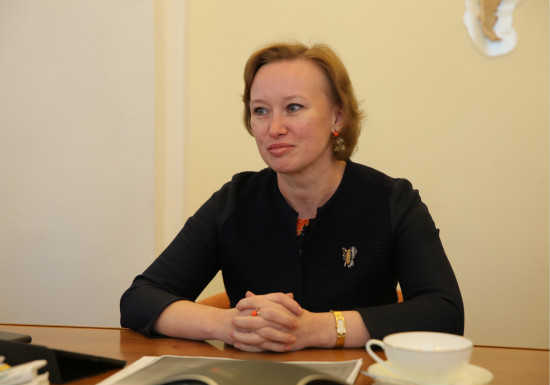Mandarin learning grows popular in Russia
china.org.cn / chinagate.cn by Li Xiaohua & Li Jingrong, December 7, 2016 Adjust font size:
The Belt and Road Initiative has increased the quantity and quality of economic and trade cooperation between China and Russia. Russia is in great need of professionals that have a good command of mandarin, said Ekaterina Babelyuk, associate professor and first vice rector of Saint Petersburg State University (SPSU) for educational, extracurricular and educational-methodical work.
 |
|
Ekaterina Babelyuk, associate professor and first vice rector of Saint Petersburg State University (SPSU) for educational, extracurricular and educational-methodical work. [Photo/CCTV.com] |
While interviewed by a visiting Chinese media delegation on Dec. 4, Babelyuk said that learning Mandarin has grown more popular in Russia in recent years, and many Russians even believe that being proficient in the Chinese language can help them secure an "iron rice bowl" – a description of a stable and well-paid job in Chinese culture.
Here is a typical example: The law major in SPSU had originally planned to recruit only 20 Russian students for the study of China program for this year's enrollment plan, but it turned out that a total of 80 were finally recruited because of a large number of applicants signing up.
Babelyuk revealed that SPSU graduates majoring in mandarin are usually employed by the representative offices of Chinese enterprises in Russia or by the Russian governmental departments and enterprises in China.
She cited an example of A• Kislov, a graduate of SPSU who won the championship in the Chinese Bridge's Russia region finals. A• Kislov currently serves as the assistant to the Russian ambassador to China, she said.
SPSU has signed 53 cooperative agreements with the Chinese education institutions over the past years. In September 2015, the Russian Research Center was inaugurated by Renmin University of China (RUC) – a cooperative project between RUC and SPSU, Babelyuk said.
In addition to cooperation in the field of colleges and universities, SPSU has also conducted cooperation with Chinese local governments, and it is intending to establish a university in northeast China's Heilongjiang Province.
Babelyuk argued that the two aspects of geopolitics and ideology have led to a hostile attitude towards the Confucius Institute in some western countries, but there is no such hostility in Russia.
"There are nearly 20 Confucius institutes in Russia, which are considered an obvious result of cooperation between college and university exchanges of the two sides. I think there is a bright future for the expansion of Confucius institutes because Russia is in great need of Mandarin teachers and the Confucius Institute can play a further important role in this regard," she said.
Founded in 1724, SPSU is the first university in Russia with a significant reputation in world university rankings. It has maintained long-term academic exchange with Peking University, Nankai University, Renmin University of China, and Capital Normal University. Both Russian President Vladimir Putin and Prime Minister Vladimir Medvedev are alumni of SPSU.